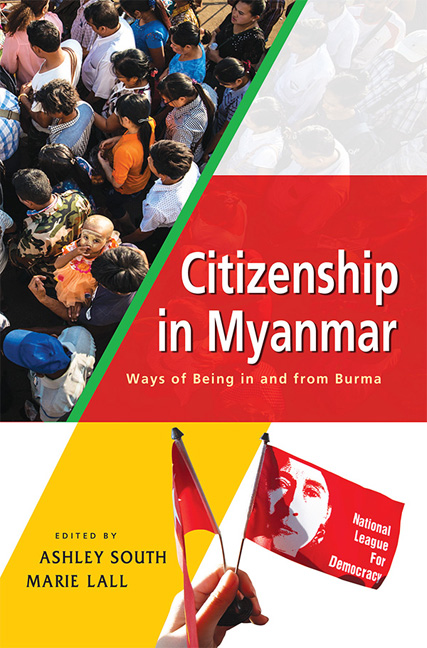Book contents
- Frontmatter
- Dedication
- Contents
- Foreword
- The Contributors
- Map of Myanmar
- Introduction
- 1 Ethnic Politics and Citizenship in History
- 2 Representation and Citizenship in the Future Integration of Ethnic Armed Actors in Myanmar/Burma
- Special Contribution: The Way Forward for Peace, Stability and Progress in Burma/Myanmar
- 3 National Political Dialogue and Practices of Citizenship in Myanmar
- 4 Citizenship and Minority Rights: The Role of “National Race Affairs” Ministers in Myanmar's 2008 Constitution
- Special Contribution: Karenni People at a Glance
- 5 Myanmar's Youth and the Question of Citizenship
- Special Contribution: I Am a Citizen of Myanmar
- 6 “The Value of Life”: Citizenship, Entitlement and Moral Legibility in Provincial Myanmar
- Special Contribution: How I Became Shan
- 7 Conflict and Mass Violence in Arakan (Rakine State): The 1942 Events and Political Identity Formation
- 8 Exploring the Issue of Citizenship in Rakhine State
- Special Contribution: Rohingya and Nationality Status in Myanmar
- 9 Myanmar's Other Muslims: The Case of the Kaman
- Special Contribution: Interview with P'doh Kweh Htoo Win
- Index
2 - Representation and Citizenship in the Future Integration of Ethnic Armed Actors in Myanmar/Burma
Published online by Cambridge University Press: 28 June 2018
- Frontmatter
- Dedication
- Contents
- Foreword
- The Contributors
- Map of Myanmar
- Introduction
- 1 Ethnic Politics and Citizenship in History
- 2 Representation and Citizenship in the Future Integration of Ethnic Armed Actors in Myanmar/Burma
- Special Contribution: The Way Forward for Peace, Stability and Progress in Burma/Myanmar
- 3 National Political Dialogue and Practices of Citizenship in Myanmar
- 4 Citizenship and Minority Rights: The Role of “National Race Affairs” Ministers in Myanmar's 2008 Constitution
- Special Contribution: Karenni People at a Glance
- 5 Myanmar's Youth and the Question of Citizenship
- Special Contribution: I Am a Citizen of Myanmar
- 6 “The Value of Life”: Citizenship, Entitlement and Moral Legibility in Provincial Myanmar
- Special Contribution: How I Became Shan
- 7 Conflict and Mass Violence in Arakan (Rakine State): The 1942 Events and Political Identity Formation
- 8 Exploring the Issue of Citizenship in Rakhine State
- Special Contribution: Rohingya and Nationality Status in Myanmar
- 9 Myanmar's Other Muslims: The Case of the Kaman
- Special Contribution: Interview with P'doh Kweh Htoo Win
- Index
Summary
INTRODUCTION
In this chapter, we discuss the future integration options for ethnic armed actors in the Myanmar/Burma peace process, and link this to questions of citizenship and representation. The focus is not only on the future political positions of the ethnic armed organizations (EAOs) and their leaders, but also on the possible civilian roles for the many middle and lower ranks. The future positions of the latter have received scant attention in the nationwide ceasefire negotiations and in national media coverage of the peace process. Based on interviews in 2014, focused particularly on armed actor integration, as well as on qualitative research in 2016 on the provision of justice by the two main EAOs in Mon and Karen States, we explore a number of possible roles that EAO actors could assume. We focus particularly on their roles as security and justice actors, as civil servants, political party members, businessmen and members of civil society organizations. Many of these roles can draw on already existing experiences of the EAOs as de facto local government actors in the areas they control. In addition, the options we outline are inspired by the international literature on “Demobilization, Disarmament and Reintegration” (DDR) (Munive and Jakobsen 2012; Muggah 2005; McMullin 2013b).
Debating the future integration options — denoting a shift from “combatant” to “civilian” identity — for ethnic armed actors, we argue, are significant to create trust in the peace process as well as to ensure longer term sustainable peace. Without concrete livelihood options and forms of recognition, there is a real risk that armed actors will be unsupportive of the peace process (Muggah 2005). Simultaneously, integration of EAO personnel and ethnic minorities more generally, into state structures can be important for fostering notions of national citizenship in a way that is inclusive of ethnic minorities’ cultural, social, economic and political rights. This implies carefully linking ex-combatant reintegration with wider local governance and security sector reform as well as addressing how ethnic political representation by EAOs can promote de facto citizenship. Thus, we argue for the need to link EAO reintegration to questions of citizenship and representation.
In line with the critical literature on citizenship, we approach citizenship not only as a set of formal rights and status — i.e. as de jure legal citizenship — but also as a set of practices (Isin and Wood 1999; Isin and Turner 2002).
- Type
- Chapter
- Information
- Citizenship in MyanmarWays of Being in and from Burma, pp. 59 - 86Publisher: ISEAS–Yusof Ishak InstitutePrint publication year: 2017



